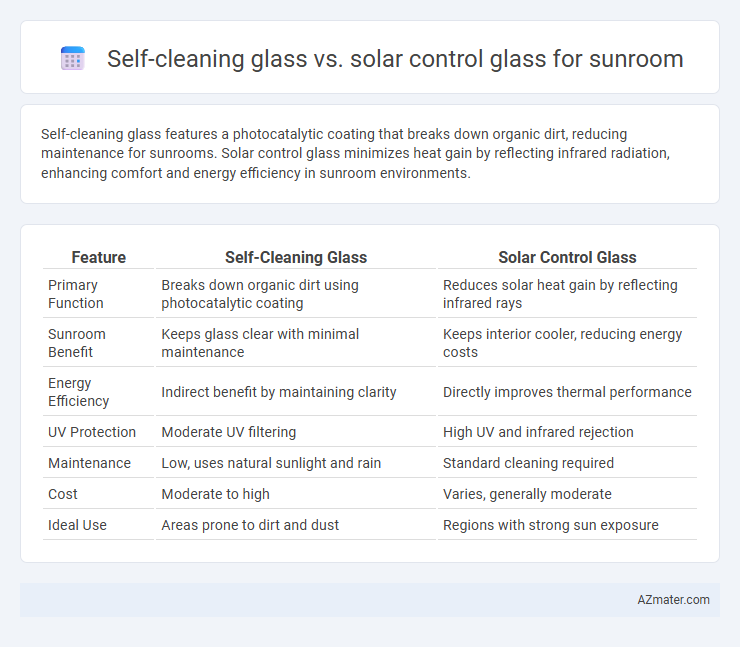Self-cleaning glass features a photocatalytic coating that breaks down organic dirt, reducing maintenance for sunrooms. Solar control glass minimizes heat gain by reflecting infrared radiation, enhancing comfort and energy efficiency in sunroom environments.
Table of Comparison
| Feature | Self-Cleaning Glass | Solar Control Glass |
|---|---|---|
| Primary Function | Breaks down organic dirt using photocatalytic coating | Reduces solar heat gain by reflecting infrared rays |
| Sunroom Benefit | Keeps glass clear with minimal maintenance | Keeps interior cooler, reducing energy costs |
| Energy Efficiency | Indirect benefit by maintaining clarity | Directly improves thermal performance |
| UV Protection | Moderate UV filtering | High UV and infrared rejection |
| Maintenance | Low, uses natural sunlight and rain | Standard cleaning required |
| Cost | Moderate to high | Varies, generally moderate |
| Ideal Use | Areas prone to dirt and dust | Regions with strong sun exposure |
Introduction to Sunroom Glass Options
Sunroom glass options include self-cleaning glass and solar control glass, each offering unique benefits tailored for comfort and maintenance. Self-cleaning glass utilizes a photocatalytic coating that breaks down organic dirt and allows rainwater to wash it away, reducing cleaning efforts. Solar control glass is designed with invisible coatings that reflect and absorb solar heat, minimizing interior temperature fluctuations and boosting energy efficiency.
What is Self-Cleaning Glass?
Self-cleaning glass is coated with a hydrophilic layer that breaks down organic dirt using natural sunlight, allowing rainwater to wash away debris and reduce maintenance efforts. This innovative technology helps keep sunroom windows clear and bright without frequent manual cleaning. In contrast, solar control glass primarily focuses on reducing heat gain by reflecting infrared rays, enhancing energy efficiency rather than cleanliness.
Understanding Solar Control Glass
Solar control glass is engineered to filter and reduce solar heat gain while maintaining natural daylight, making it ideal for sunrooms that require energy efficiency and comfort. Unlike self-cleaning glass, which features a photocatalytic coating to break down organic dirt and improve maintenance, solar control glass primarily focuses on reflecting infrared radiation to minimize cooling costs and UV exposure. Choosing solar control glass for a sunroom enhances thermal regulation and protects interior furnishings from fading without compromising on light transmission.
Key Differences: Self-Cleaning vs Solar Control Glass
Self-cleaning glass for sunrooms features a special photocatalytic coating that breaks down organic dirt when exposed to sunlight, reducing maintenance by allowing rain to wash away loosened debris. Solar control glass incorporates a selective coating that reflects and absorbs a significant portion of solar heat, improving indoor comfort and reducing cooling costs by minimizing solar gain. While self-cleaning glass prioritizes ease of maintenance and clarity, solar control glass emphasizes thermal regulation and energy efficiency.
Sunroom Comfort: Heat and Glare Management
Self-cleaning glass enhances sunroom comfort by reducing maintenance and maintaining clear views but offers limited heat and glare control compared to solar control glass. Solar control glass contains coatings or tints that effectively block infrared radiation and reduce glare, significantly lowering indoor temperatures and enhancing comfort. For optimal sunroom heat management, solar control glass provides superior performance in minimizing solar heat gain while preserving natural daylight.
Maintenance and Longevity Comparison
Self-cleaning glass for sunrooms reduces maintenance by utilizing photocatalytic and hydrophilic coatings that break down organic dirt and facilitate rainwater cleaning, minimizing manual washing frequency. Solar control glass enhances longevity by reflecting and absorbing solar radiation to reduce thermal stress on frames and interior furnishings, which can degrade over time with prolonged UV exposure. Choosing self-cleaning glass lowers routine cleaning costs, while solar control glass extends the sunroom's structural and material lifespan by mitigating heat-related wear.
Energy Efficiency in Sunrooms
Self-cleaning glass enhances energy efficiency in sunrooms by reducing the need for maintenance, allowing maximum solar gain while minimizing heat loss due to its hydrophilic and photocatalytic properties. Solar control glass improves energy efficiency by reflecting and absorbing a significant portion of solar radiation, reducing heat buildup and lowering cooling costs without sacrificing natural daylight. Combining both technologies can optimize thermal comfort and energy savings in sunrooms by balancing heat retention, glare reduction, and ease of maintenance.
Cost Analysis: Initial and Long-term Investment
Self-cleaning glass for sunrooms generally has a higher initial cost due to its nanotechnology coating that reduces maintenance expenses over time. Solar control glass offers energy savings by reducing heat gain, potentially lowering cooling costs and providing a favorable long-term return on investment. Comparing both, self-cleaning glass minimizes cleaning costs, while solar control glass excels in energy efficiency, making the choice dependent on specific budget priorities and climate conditions.
Aesthetic Impact on Sunroom Design
Self-cleaning glass enhances sunroom design by maintaining a clear, spotless appearance with minimal maintenance, preserving panoramic views and maximizing natural light. Solar control glass reduces heat gain and glare, allowing for a cooler interior without compromising daylight, thus supporting a comfortable and visually balanced environment. Combining these technologies optimizes both aesthetics and functionality, making sunrooms more inviting and visually appealing year-round.
Choosing the Best Glass for Your Sunroom
Self-cleaning glass incorporates a special coating that breaks down organic dirt using sunlight and washes away residue with rain, reducing maintenance for sunroom windows. Solar control glass is designed to minimize heat gain by reflecting and absorbing solar radiation, improving energy efficiency and maintaining cooler indoor temperatures in sunroom spaces. Selecting the best glass for a sunroom depends on balancing ease of upkeep with thermal performance, considering local climate and sun exposure to achieve optimal comfort and durability.

Infographic: Self-cleaning glass vs Solar control glass for Sunroom
 azmater.com
azmater.com